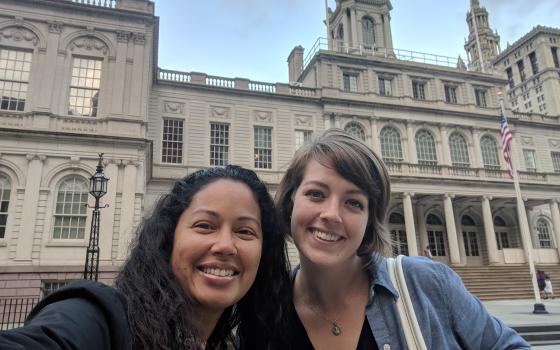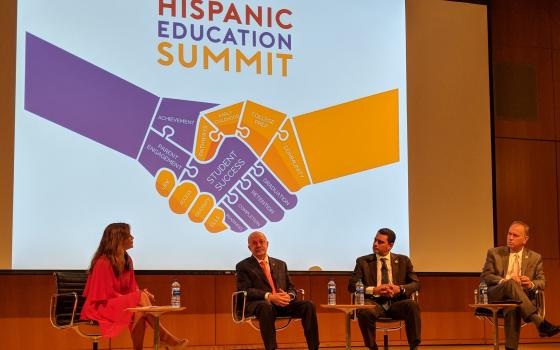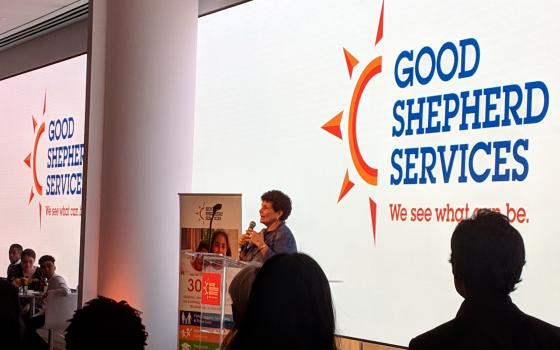Notes from the Field includes reports from young people volunteering in ministries of Catholic sisters. A partnership with Catholic Volunteer Network, the project began in the summer of 2015. This is our ninth round of bloggers: Samantha Wirth is the public policy fellow for Good Shepherd Services in New York City and Adele McKiernan is a Loretto Volunteer at Missouri Health Care for All in St. Louis.
___
Each weekday, the Sisters of the Good Shepherd Province of Mid-North America sends an email with a quotation from the congregation's foundress, St. Mary Euphrasia. These daily words have occasionally matched what was happening in my life at the time, like a surprisingly accurate horoscope, even further grounding me in our work as Good Shepherds.
They also send out a mission reflection from a congregation partner — a Good Shepherd Sister, program staff member, or volunteer — every month. Occasionally, I'll see a reflection by one of the staff members at my first volunteer placement in New Jersey, and it is a beautiful reminder that we are still one Good Shepherd family always working to be in community and to grow together. Even from congregations and programs around the world, the words of my partners in mission can continue to encourage the light of my internal zeal candle.
As I was reading back through some of the previous monthly mission reflections to prepare for my own contribution in June, I was reminded of one that resonated with me when I first read it in January. Written by Sr. Mary Carol McClenon, the piece is titled: "Community In a Coffeepot Triumphs Over a Tempest In a Teapot."
In her piece, Sister Mary Carol writes about the Good Shepherd family:
Family should be a place where it is safe to cry, to tease, to argue, and to express uncommon kindness. Safe to cry — that's a must in Good Shepherd service, because there is so much sadness in the situations we encounter. Emotions are not forbidden, and colleagues are usually quick to be supportive, not frightened by someone showing his or her "weakness" since we recognize that compassion is strength. … With Good Shepherd People, by and large, our Core Values of Reconciliation and Mercy encourage and empower us to make up and move on.
Every time I read this, I think about the anti-racism work the staff of Good Shepherd Services engage in every day. When I first started my year of public policy here in New York, my woke supervisor ushered me straight into the diversity and inclusion work our agency has been engaged in for the past few years.
As someone who grew up in the rural Midwest and attended college in northern Indiana, I had never been faced with my inherent white privilege and implicit bias the way I was here in New York City. Since the start of this year, diversity, equity and inclusion work have been the backbone of the trainings, ad hoc workgroups and agency-wide council meetings I have joined.
"Equity and Inclusion" is one of the six strategic directions in Good Shepherd's five-year strategic plan, one the entire agency can engage together. It is especially critical I bring this lens of anti-racism with me as I transition between my work as a public policy fellow, examining laws and guidelines that oppress the people we strive to serve, and as a volunteer in the larger Good Shepherd community.
We have even created a book learning committee and read Decolonizing Wealth by author Edgar Villanueva, who we then saw speak at a local bookstore a few months later to round out our understanding of the process of decolonization, healing and what that can look like in practice at a nonprofit like Good Shepherd Services.
To be honest, when I signed up to be a public policy fellow, I wasn't expecting to spend around 50% of my time on anti-racism work in a given week. I also wasn't expecting to learn so much about myself through the process — or realize that I needed to. Now, I understand just how much time I have to make up for and how much I can and should be doing as a white woman to gather my people and talk about our internalized racial supremacy as our colleagues of color do the same and discuss their internalized racial oppression.
As my supervisor and many of my colleagues are quick to say time and time again, not everyone is ready for these kinds of conversations, and we need to be able to encourage, uphold and support one another as we work through this together. We need to be allies to all kinds of folks. Fortunately, in the Good Shepherd community, we have our charism to guide us.
As Sister Mary Carol says in her reflection, "We do it for each other because we do it for those we serve, as an expression of our Core Value of Individual Worth."
Along with understanding and expressing our core value of individual worth, we at Good Shepherd Services uphold the other guiding values of reconciliation, mercy and zeal to shepherd us through the process of "decolonizing ourselves," as Villanueva puts it. We actively choose to engage with one another, knowing how hard it can be and how frustrated we may feel at times, yet we strive to reconcile our missteps, show one another mercy and protect the light of our internal zeal candle when it grows faint. Without this sense of community, our trust in the process and one another would falter, and our work would scarcely move forward.
I know that this work is deeper than me and has gone on and will continue to go on beyond my time as a Good Shepherd Volunteer. However, following the idea of "both/and" instead of "either/or" thinking, I will both continue to do all I can in learning and growing personally, as a part of Good Shepherd Services and the Good Shepherd Community worldwide, and carry the work as I move forward on my path beyond this year of service.
Just when I thought I was getting the hang of the essence of Good Shepherd spirituality, I am reminded that people around the world devote their entire lives to understanding the complexity of the Earth and our place within it. At least I feel like I'm on the right path.
At the end of her piece, Sister Mary Carol asks, "How can we replicate this sort of deep belonging and acceptance for each other?"
I would like to forward that question and consider the ways we can create spaces for these kinds of difficult conversations, conversations where we end the way Good Shepherd Sanctuary check-ins encourage us. Listen actively, and in the end say, "I got you." Whatever you need, however I can help, "I got you."
[Samantha Wirth is the public policy fellow for Good Shepherd Services in New York City.]




